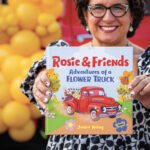
Aaron Jumper
It had to be the worst Christmas gift ever.
“I woke up Christmas morning, 2020, with the gift of COVID-19 under the tree,” said Aaron Jumper of Duncannon.
The 34-year-old had always been in good health, and his bout with the infectious disease was “very mild—mostly body aches with no other significant symptoms.”
About a month later, he started realizing his case of COVID-19 was far from over.
“I was working on the computer, and I was getting migraines and tension headaches from issues with my vision,” said Jumper, who serves as public relations manager for the Cumberland Valley Visitors Bureau.
He never needed glasses before, but off he went to the eye doctor for his first pair.
By Valentine’s Day, there was another new development.
“My wife made me a steak, and it tasted off,” Jumper said. “Later that week, it was chicken, and it started a progression of foods—eggs, bread, chocolate, soda—a litany of items. The taste of those foods was completely off. I wish I could describe it, other than to say it just all tasted foul.”
Throughout the summer, he lost 15 pounds, primarily because he couldn’t stand the taste of most foods. His sense of smell was affected next. Then headaches turned into neurological issues. Almost a year later, he developed an extreme sensitivity to light. Muscle spasms randomly took over his body. Additional health issues—painfully dry eyes, ringing in his ears, pressure in his head—made Zoom calls nearly impossible.
“I couldn’t look at devices more than five minutes without being in pain last winter,” he said.
All of Jumper’s symptoms are attributed to the lingering effects of COVID-19, referred to as long COVID or long-haul COVID. And he’s a “long-hauler.”
“I spent a lot of my time focused on vision issues in 2021—I saw five different eye doctors,” said Jumper, who keeps a list of the sequence of events, doctors’ names and treatments, on his phone “so that when I meet with a new doctor, I have my entire history at my fingertips.”
That list includes a local neurologist and physical therapist, plasma treatments at Philadelphia’s Jefferson Hospital, nerve injections and sinus-related surgeries. He’ll add another doctor to the list soon—a neurologist with Philadelphia’s Penn Medicine who’s seeing long-haul COVID patients seeking relief from light sensitivity. Jumper can no longer drive at night, and the family swapped out their home’s light bulbs for softer ones. Doctors have told him the severity of his light sensitivity is comparable to concussion recovery.
Despite everything that’s happened, he considers himself lucky that he never had to be on a respirator, as many acute COVID-19 patients have. And there have been small victories.
“I really missed watermelon,” Jumper said. “In 2021, it tasted terrible, but the taste came back, and I enjoyed it in the summer of 2022. It’s a small win.”
A Facebook group for long-haulers across the country is helpful at times, but it can also be anxiety-producing. He reads everything he can find about long-haulers, experimental treatments and the doctors behind them.
“It’s definitely affected my quality of life,” Jumper said. “I was relatively healthy and active before this, with very little health issues, so this has been challenging. Nothing about me was at high risk for COVID-19. I just don’t know what the determining factor is.”
COVID Clues
Are there theories about why COVID symptoms linger and turn into long-term issues for some people, like Jumper?
“There’s not a clear-cut answer for that,” said Dr. Navdeep Brar, UPMC Pulmonary and Sleep Medical Director based at UPMC Harrisburg. “It’s thought to be some kind of immunological phenomena. This is a hypothesis—that some people have different immune system reactions going into overdrive, triggered by the infection or reinfection which causes lingering symptoms.”
While there’s no cure for COVID, there are specific treatments, such as pulmonary rehab, to address some of the symptoms, including improved lung health.
In her position with UPMC, Dr. Brar manages critical and acute COVID patient care and post-COVID patient care. She said that 10% to 20% of COVID patients experience recurring, long-haul symptoms.
“We opened this new pulmonary clinic in Harrisburg in January of 2022, so it’s been a year,” Dr. Brar said. “It was an underserved specialty. There was no pulmonary clinic here for post-COVID patients—everything was on the west shore.”
The most common symptoms reported by long-haulers are fatigue, headaches and shortness of breath. According to Dr. Brar, a small percentage of long-haulers experience joint pain, chest pain, brain fog and gastrointestinal issues.
“I think there’s definitely much to learn [about COVID-19],” Dr. Brar said. “Unfortunately, the treatment is limited, so what we focus on is more rehabilitation. We focus on breathing, exercise, building up strength and stamina again.”
Meantime, Jumper continues to seek relief through innovative treatments both within and beyond central PA. And the experience has changed his perspective on life.
“I try to keep a positive attitude about it. There are rough days, but it’s made me more cognizant of other disabilities people have and my other senses that still work,” Jumper said. “Maybe this is on the spiritual side of things, but this is a trial. Being empathetic was one of my lowest skill areas a few years ago. So, if I’ve gained anything from this, I’ve gained empathy and compassion for people with long-term health challenges.”
For more information on UPMC’s Post-COVID Pulmonary Care, visit www.upmc.com/services/south-central-pa/lung/pulmonology/rehab.
By the Numbers
It’s been nearly three years since COVID-19 struck the United States, exacting a devastating toll.
- 8 million confirmed cases in PA
- 49,000+ deaths in PA
- 19% of COVID patients report long-haul symptoms nationwide
- 12.4% of PA adults report long-haul COVID symptoms
If you like what we do, please support our work. Become a Friend of TheBurg!





